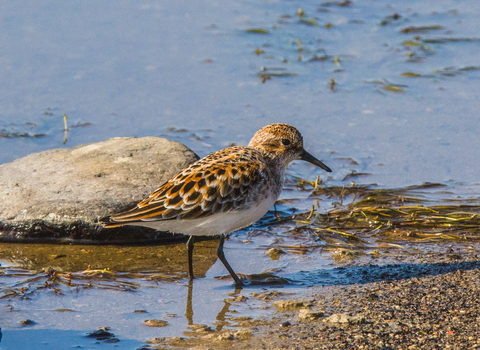
Little stint © Pete Richman
Little stint
This tiny wading bird is most often seen in autumn, feeding on the muddy margins of wetlands.
Scientific name
Calidris minutaWhen to see
Mainly April to June and August to OctoberTop facts
Stats
Length: 14-15cmClassified in the UK as Green under the Birds of Conservation Concern 5: the Red List for Birds (2021). Protected in the UK under the Wildlife and Countryside Act, 1981.
Habitats
About
Little stints are tiny wading birds. They nest on tundra in northern Scandinavia and Siberia, spending the winter in Africa, South Asia and southern Europe. A few birds may overwinter in the UK, but most are seen passing through in autumn, with smaller numbers in spring.Little stints are usually found feeding on estuaries or the muddy shores of wetlands. They often join flocks of other waders, particularly dunlin. Most of the birds seen in autumn are juveniles, with distinctive white lines running along their back.
What to look for
The smallest wader regularly encountered in the UK, generally about two-thirds the length of a dunlin - though dunlin can be very variable! When seen with other waders, the small size usually stands out. It has a medium-length black beak that narrows to a fine tip. The legs are medium length and dark.In summer, adults are very bright little birds. They have a white belly and throat, with an orange wash to the face and breast sides. The back feathers have black centres with bright, reddish-brown fringes. In winter, they become much duller, with grey back feathers and a greyish wash to the face and breast sides.
Juveniles are strongly patterned on their back, with some dark-centred feathers fringed with white and others with reddish-brown. They have two distinct white stripes running along their back, like a pair of braces.
